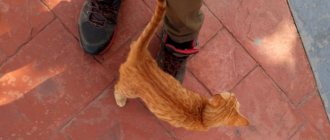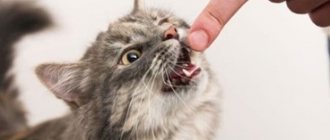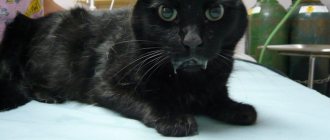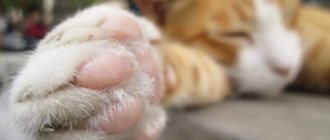Let's say you are gently petting your cat, and she begins to frantically bite your hand. Many cat owners wonder, “Why does my cat bite me?”
These so-called "cat love bites" do not usually cause bleeding, but they do occur suddenly, leaving you wondering what caused the change in your cat's behavior.
“Bitting their owners while petting them is one of the most common behavioral problems in cats,” says Dr. Vyacheslav Kolokolnikov, a board-certified veterinarian at the Moscow College of Veterinary Medicine.
Veterinarians are studying what cat love bites are, why cats exhibit this behavior, and how pet owners can respond appropriately when their covered cat feels the urge to bite.
Reasons for strange biting
According to experts, a cat can bite its owner in the most peaceful and calm situation under the influence of a number of factors:
- Lack of training is most typical for kittens or animals whose training is not given due attention. Sometimes a cat may experience fear towards a person, especially if it has recently entered the house, which gives rise to aggression as a defensive reaction.
- Play is also a characteristic manifestation for babies, who, biting and scratching, have so much fun spending time with their beloved owner.
- Self-preservation instincts - most cats do not like stroking and touching in the abdomen. Even gentle movements in this area can provoke aggression. You should also not stroke your pet's hind legs, since most cats feel vulnerable and are capable of reacting inappropriately to affection. We should also pay attention to the tail - the area where nerve endings are concentrated. Even the slightest touch to the tail causes pain and discomfort in cats.
- Negative memories - an animal may react inadequately to manifestations of love if it has recently undergone vaccination, bathing, claw trimming and other unpleasant procedures.
- Maternal instinct - manifests itself in cats expecting the birth of offspring or nursing kittens.
- Manifestation of dissatisfaction - if a usually friendly pet begins to bite and scratch when stroking it, then perhaps he is simply hungry or wants to sleep.
- Pain – painful sensations and poor health often cause anger in cats. Especially if the owner does not deliberately touch the area where the diseased organs are located.
- Birth injuries – the birth process in cats is often difficult, leading to slight pinching of the kitten’s spinal column, in the area near the tail. Naturally, touching in this area causes pain, discomfort and a desire to defend itself. If your pet reacts by biting precisely when this area is touched, then you should simply concentrate the stroking on other places. Most cats love to be stroked behind the ears or at the withers.
These are the main reasons that should be taken into account if your pet does not behave friendly when trying to express your affection and love to it.
It is important to monitor the animal’s condition; in some cases, nervous reactions are a reason to change the cat’s living conditions or seek help from a veterinarian.
What cat love bites are and aren't
Don't confuse cat love bites, also called petting aggression, with a type of overly aggressive biting associated with fear, defense, or territorial behavior.
Cat love bites usually do not damage the skin. It all starts with licking your hand, then the cat grabs your hand with its paws and you can feel small teeth on you.
Another sign that your cat likes to bite is that other signs of aggression, such as hissing, growling, and scratching, are generally absent.
Features of cat psychology
We should not forget that cats, by their nature, are independent animals that need privacy. With frequent contact with a person, endless display of affection, and the inability to be alone with itself, a cat can become irritable, nervous and aggressive.
It is worth paying attention to such behavioral features as tension, pressing ears, wagging the tail, dissatisfied rumbling, hissing, dilated and enlarged pupils. In this case, it is better to leave the pet alone for a while and wait until it itself shows a desire to communicate with the owner.
Veterinarians explain the state of aggression by the fact that cats have an increased sensitivity threshold compared to humans and other pets. In addition, the animal may simply be in a state of nervous excitement, requiring temporary rest and solitude.
In some situations, a cat, and especially a male cat, can demonstrate its dominant behavior in this way, showing who is the leader. This kind of behavior should definitely be stopped in order to avoid more serious problems in the future.
Thirteen reasons for cat attacks
In order to ensure that mutual communication with the furball brings only positive emotions, it will be useful for all owners to study the possible causes of aggressive behavior. Naturally, this does not mean at all that all of them, without exception, are present in the behavior of your particular Murzik. The character of each naughty girl is individual, and the exclusion of at least one of them can solve all problems.
| Name | Decoding |
| Lack of access to communication | Independent exploration of their own environment should begin in kittens over three weeks of age. Do not try to hide your baby from guests who come into the house or lock him in the room while the vacuum cleaner is running. In this way you limit his cognition. A grown up little hermit will be afraid of everything: a new person, sharp sounds made by a bread machine, the roar of a washing machine. |
| Painful sensations | Cats are not given the ability to tell us what hurts them. Sometimes they have wounds on their bodies that are not visible under their fluffy fur. Naturally, your caresses are unpleasant to them in these places. It is the bite that says: “you don’t love me, stop!” |
| Irritating factors | Furballs love to be touched and petted, but in moderation. This is not the type of animal that will be constantly happy when interacting with its owner. Your prolonged stroking will eventually irritate the cat. Biting, he will say: “Stop your caresses. I need to be on my own!” |
| The desire to take a dominant position | Just like people, cats can be strong leaders. By attacking, they show who is the leader in this room. Why does a cat bite when you pet it or just pass by? Precisely to clarify that this is his territory. |
| Protecting the Cubs | A mother cat that has already given birth or is awaiting this miracle may bite the owner’s hand if he tries to stroke her belly. Also, during the lactation period, you should be more careful with blind kittens so as not to harm the babies. |
| Itching and discomfort in the mouth | It is known that when teething, little children pull on everything that is not lying well: blocks, pens, toys, etc. The actions of kittens are in most cases similar. In this way they try to relieve the itching. |
| Past unpleasant facts | Not all people are animal friendly. Some people, instead of a light slap, prefer to fight with the unfortunate creatures. If the cat has been hit repeatedly, then a bite in this case will be one of the methods of self-defense. |
| Excess of feelings | An animal can bite its owner out of strong love and affection. You may have repeatedly observed that when you are being treated affectionately, they try to grab your hand. It is precisely such moments of special closeness with a person that are a manifestation of an excess of warm feelings. |
| A game | Overstimulation by noisy games provokes attempts to bite, scratch or jump on your fun companion. |
| Revenge | Moral teaching in the form of shouting and assault for a puddle on the floor may not go unnoticed. A vengeful animal can attack at the most unexpected moment, when a person can even forget about the recent conflict. |
| Hormonal changes | Unsuccessful childbirth, castration, sterilization or an interrupted hunt for a sex partner are prerequisites for aggressive behavior and the desire to constantly bite. |
| Aggression | There are animals endowed with incorrigible bad temper. Just like people who, after a second of communication, spoil the mood, insulting others and criticizing them for no reason. Aggressive cats are unhappy with literally everything that surrounds them |
| Serious infectious disease | Various infectious diseases have a negative impact not only on general health, but also stimulate negative behavioral changes. |
Pathological conditions
The exact reasons why a cat bites can only be determined by carefully observing your pet. Apathy, lethargy, bowel movements, permanent lack of appetite, combined with aggressive behavior, may be symptoms of a serious illness that requires immediate attention to a veterinary clinic.
If the cat has never bitten before and behaved peacefully, then a sudden change in behavior may indicate the development of certain pathologies, for example:
- infectious and inflammatory processes;
- periodontitis;
- cervical arthritis;
- renal pathologies.
Traumatic injuries, sometimes invisible to the naked eye, also cause severe pain to the animal, especially when touched.
How to recognize readiness for an attack?
Usually a cat does not bite suddenly. You can recognize an impending attack by the following signs: :
- stopping purring;
- active movements of the tail begin;
- attempts to change position;
- gradual tension of all muscles of the body;
- sounds other than purring (growls or purrs);
- dilated pupils;
- Ear pinching or active ear movement.
If affection gives way to aggression
Often, cat owners are faced with a completely incomprehensible situation: a furry pet first purrs and caresses, and then suddenly suddenly changes its mood and begins to bite. Animal psychologists believe that the reason for this strange behavior is:
- Demonstration of independence . The fact is that predatory, hunting instincts are given to representatives of the cat family by nature itself. Therefore, an animal can exchange anger for mercy and, conversely, show that it is ready to give and receive affection only according to its mood and will not tolerate intrusiveness.
- Change of mood . Initially, stroking can really be pleasant for a furry pet, but after a while the cat gets tired of it, its mood changes, and with light bites it shows the owner that it is enough for now with displays of tenderness.
- The desire to keep the situation under control . Bites are a way to show that further events will develop depending on the pet’s wishes.
- Distrust of people – this pattern of behavior is often observed in animals picked up from the street, who have had to deal with human cruelty more than once. Therefore, the new member of the family will need a lot of time to adapt, and the owner will need patience.
In such situations, it is better to simply not bother the cat with your attention and try to correct its behavior in gentle but effective ways.
The cat bites just because why
Cats may bite their owner's hand out of boredom. Life in an apartment is not varied, so there are few entertainment options. Busy owners may not pay attention to the animal, but this does not make the hunting instinct disappear. And if it cannot express its emotions in the game, then an unexpected bite remains the only entertainment.
Give your cat attention and play with her. Cats seem independent, but it is difficult for them to entertain themselves in an apartment. Set up a scratching post with a hanging fishing rod toy so your animal doesn't get bored while you're away from home.
What can influence a pet's character?
Some physiological and psychological aspects can also affect the character of cats, changing their behavior and attitude towards the owner and his affection. Unexpected aggression, manifested for no apparent reason, can be provoked by:
- Puberty . At this time, young cats behave like teenagers - aggressively, demonstratively. This is explained by hormonal surges and the emergence of new physiological needs. The solution here would be to find a mate for the pet or castration.
- Declawing is a major stressor for your pet. Feeling vulnerable and defenseless, a cat may try to defend itself with its teeth, even without visible potential danger.
- Lack of attention and care . Lack of communication and poor living conditions do not have the best effect on the psychological state of a pet. Therefore, it is worth finding about 15-20 minutes every day to play with your pet.
- Changing baby teeth to molars is accompanied by itching and unpleasant sensations in the gum area in kittens, which they try to eliminate with bites. Providing your pet with special toys designed for these purposes will help solve the issue.
Only by finding out the reasons for the strange behavior of your furry pet can you find the right options for its correction.
Aggression for no reason: why do we get it?
There were no signs: you were playing peacefully with the animal or just sitting next to it, running your palm over the pet’s fur. All that happened after was a sudden attack, bites and scratches. The owner was shocked, and the “wild beast” fled the crime scene. How to recognize a threat and prevent a fight, and most importantly, understand why you became a victim?
photo from the site: www.medicaldaily.com
Experienced owners know that nothing happens “just like that,” and there is a reason for your cat’s bad behavior. True, it is very difficult to fully understand what causes outbursts of uncontrollable aggression in animals. There are several theories that explain the hostility that pets so violently display towards their owner. And here are just a few of them.
How to stop a cat from biting
Stopping a cat from biting and scratching, especially when being petted, is a fairly simple task. Initially, it is important to make sure that the animal is healthy, receives enough attention and at the same time has the opportunity to retire and relax. If provoking factors are excluded, then you can use the following educational methods:
- Education and repetition . Every time you try to bite, you should spray the animal with a spray bottle, blow it with a hairdryer, or simply press it to the surface, as mother cats do. At the same time, say in a calm, but confident, firm voice that you cannot do this.
- Ignoring and isolation . If a pet behaves inappropriately, it is recommended to ignore it for a certain time and not pay attention. As a rule, the animal learns such lessons well and does not repeat its mistakes.
- Noise impact . You can scare a cat and wean it from the desire to bite by loudly clapping your hands whenever it shows aggression.
- Hanging a cat by the withers for a few seconds has a good effect.. This manipulation relieves aggression and reminds of the lessons learned in childhood from the mother.
Systematic implementation of these rules will soon help wean your pet from the bad habit of biting when stroking.
Carefully! The cat gave birth to kittens
Cats have a highly developed maternal instinct. And they are ready to fight an enemy much larger and stronger if they believe that their offspring are in danger. They do not warn of an attack, but begin to attack unexpectedly, trying to cause maximum harm in the first seconds. The face, eyes, ears, hair, stomach, arms, legs may be affected.
Some pets trust their owners and do not feel worried when they touch newborns or pick them up. But be careful: a purring mother may lose her composure if the kitten meows loudly.
Do not allow guests to touch the kittens until they leave the nest and begin walking around the house or apartment on their own. If your pet is wary of guests, do not let them into the room where she feeds her babies.
Additional recommendations
You can establish a relationship with a cat by taking into account its psychology, instincts and observing the pet’s behavior. Good results will be achieved by following these simple recommendations:
- Observing the cat's reactions when showing affection . If the cat is tense and wary, then you should let her go and give her some privacy.
- Determining the time limit . Using the test method, you can determine when the animal responds well to stroking and when it begins to get nervous.
- Treat . You can simply accustom an animal to hands and displays of affection by offering him his favorite treat after such close communication.
- Determining places for stroking . By experimenting, you can determine in which places the animal reacts kindly and peacefully to stroking, and which areas of its body are better not to touch. This is a purely individual question.
It is recommended to try to accustom the kitten to hands and stroking as early as possible, then in the future he will respond well to manifestations of tenderness from the owner.
Aggression through sleep
photo from website: student.cnnindonesia.com
If the cat falls asleep in your arms, try not to make sudden movements. Otherwise, the pet will not understand what happened and may bite you painfully, frightened by your touch and instinctively protecting itself.
Also, such behavior of a pet can be explained by an attempt to control the situation - this is how your pet is trying to tell you: “I decide when I can be petted and when not.” At the same time, the position he occupies is dominant. That is why it is important to accustom your cat to a different state of affairs, because you should be the master of the house, not a capricious animal.
Norm or pathology
In a healthy state, a cat caresses and then bites for reasons that are determined by their psychology.
IMPORTANT: if a pet easily bites fingers and does not release its claws, this is a sign of trust in its owner.
In normal condition, the pet can allow itself to gently bite the owner's finger
- You may want to pet your cat, but she doesn't always want to. Imposition and violation of boundaries are the most common reasons for this behavior. Often this is how an animal lets you know that it wants to take a break from displays of tenderness.
- It is likely that the cat likes one of the family members the least. Such touches will cause your pet to become impatient, along with an attempt to pull away.
- Cats love children, but not to the point of falling. Children often make noise and are prone to sudden movements. As you know, cats are extremely peaceful creatures. These reasons can cause irritation in the animal, which in turn can lead to a bite when trying to pick up or pet the cat.
- Your pet's character can develop into an exceptional individual. Temperament, habits, habits - all this is not always amenable to re-education.
- The gender of the pet plays a significant role: if the cat is more inclined to independence, then the cat will try to dominate.
IMPORTANT: by defending itself with its front paws, the cat demonstrates in a “civilized” way a request to leave it; real aggression manifests itself when it tries to lie on its back and defend itself with its hind paws - their attack will be the most painful.
Sometimes a bite can signal the development of a serious pathology.
Attacking with the hind legs can be very unpleasant
- Your pet may suffer from pain: back, stomach, head, skin problems and much more. As a rule, when feeling unwell, the animal becomes apathetic, irritable, tries to retire and may lick the disturbing area. The cat will react negatively to touch.
- Gaps in upbringing can also cause conflict behavior in an animal. Up to seven weeks, kittens are accustomed to being stroked by humans - this way they learn socialization and do not show aggression in the future.
- Negative experiences can create an “unsociable” character and mental disorder in an animal. A kitten may face survival in the wild, which is fraught with trauma; adult cats and cats experience fear, pain, resentment and even cruelty. These manifestations hurt the animal’s psyche, forever making it overly cautious in communicating with people.
Pay attention to your pet's well-being
IMPORTANT: alarming signals in your pet’s behavior: lack of sociability, suspicion of deterioration in health, severe aggression when trying to touch a certain place - a reason to consult a veterinarian.
How to behave as an owner
To stop your pet from biting
A bad habit should be broken. This is easy to do at a young age.
Kittens are accustomed very early to the presence of humans. They should be held in your arms and stroked. You cannot play with the kitten using your hands. There are special devices for games.
By visiting a veterinarian, you can ensure that your pet does not have any health problems that could cause aggressive behavior.
If a cat begins to bite during play, then you cannot punish for this, since opposition can cause aggression and revenge. In this case, the correct thing to do would be to remove your hand and leave the pet without communication for a while. You can distract the animal with a toy.
Another method to stop biting is to grab it by the scruff of the neck and hold it suspended for a while. This is how my mother taught me to purr in childhood, so it will be a reminder for the pet.
Gently and persistently show your cat that biting is not allowed. The situation should not be allowed to continue to bite. At the first instances of aggression, action should be taken.
If a cat has become angry and aggressive at an adult age, then you should reconsider your behavior. You may have offended her at some point. These fluffies are vindictive and vindictive.
When the attack begins
If the cat has already begun to show aggression, then you can use the method described above - by grabbing the scruff of the neck. If the pet has managed to cling with its teeth, then cry out sharply, stop contact and ignore the purr until it “apologizes”.
You should not jerk your hand back sharply, as this can cause an additional surge of aggression. You need to freeze for a while, wait for the pet to calm down, and then make a movement towards it and make a hissing sound. The cat will prefer to quickly leave.
Pets, when settling in a house, become “members of the family.”
They will defend their rights if they don’t like something. If at the very beginning the purrs are shown all the rules of behavior laid down in the family, then there will be no place for aggression in their lives.
Author of the article Bogdanova Ekaterina Dmitrievna Rate the usefulness of the article 0 Using these ratings, we make the site better
Why does a cat rub against the feet or shoes of its owners?
An attentive owner will always understand from the cat’s behavior how predisposed it is to affection. Animals are not able to hide their feelings and clearly demonstrate their desires. A cat enjoying stroking stretches under your hand, purrs, its body is relaxed at this moment.
Otherwise, nervous twitching of the skin is observed, the animal is grouped, the tail makes sharp swings. If you continue to pet your pet in this state, there is a high probability of feeling the sharpness of his teeth.
There are many reasons why a cat might bite. Each case requires separate consideration. The peculiar behavior is influenced by:
- Character. A cat is an independent, freedom-loving animal, preferring to communicate only when there is a desire.
- Sensitivity. At first, the cat likes your caresses. But at some point the monotonous stroking gets boring. He cannot express his dissatisfaction in words, so he uses his teeth.
- Pain. When stroking the fur, static electricity occurs, causing nervous irritation that turns into pain, which provokes a surge of aggression.
- Having fun. Many owners are puzzled by why the cat first licks and then bites the owner. In this way, the animal responds to affection, mistaking it for a game and enjoying lightly biting the skin. Such entertainment should be stopped by showing your dissatisfaction.
- Lack of communication. A cat, not accustomed to the company of people since childhood, will always stay away, not allowing any affection. A person represents a real threat in her eyes, causing a feeling of fear and, consequently, aggression.
- Negative past experiences. If you once had to fraudulently lure a pet into performing unpleasant procedures for it such as bathing, treatment, or trimming its nails, it will remember this for a long time. Any manifestations of affection on the part of the owner will be perceived as an attempt at violent action.
- Cat pregnancy. It has been noticed that many animals become a little wild during the period of bearing offspring. The instinct of self-preservation kicks in.
There are many more reasons why a cat first licks your hand and then bites it. This could be the smell of a dog emanating from a person, which was petted on the street, or the aromas of perfume or cream. The animal's sophisticated sense of smell is unable to bear this. Aggression can be caused by an attempt to stroke the belly - one of the forbidden places that the cat does not tolerate touching.
Another way to convey your emotions and desires is to bite and scratch. This behavior is not always explainable to a person, and sometimes it seems to him that the cat bites for no reason, just like that.
But this is not so, such behavior always has a reason:
- It is not uncommon for an owner to give his pet a good beating for stealing a piece of sausage from the table: teach him a lesson with a broom or slipper, spank him with a towel, or throw him out into the street with a kick in the tail in the bitter cold of winter. Because, having received what he deserved, the cat will remember and will no longer misbehave. The cat will really remember and……. will take revenge. Therefore, when the owner has forgiven his fluffy cat and again tries to bestow affection on him, he may remember the offense;
- Sometimes the cat really wants to do something, but the owner doesn’t allow it. And then he shows stubbornness, biting and scratching;
- A kitten, like a child, can bite when it is teething;
- Cats often bite their kittens to show them their love. Such bites are weak and painless. If a cat slightly bites your hands, she is showing her love;
- Cats are predators by nature, but in a cozy human home there is always food, water and a warm sofa. Only the instincts still make themselves felt, and the energy requires an outlet. And then the cat plays, runs after a ray of sunlight and bites;
- During illness, a cat, like a person, can hardly enjoy any kind of affection; he just wants peace and relaxation.
Bites and scratches from a cat are not entirely pleasing to the owners; it is much more pleasant if the cat licks them. But she also doesn’t just give out her “cat’s affections”:
- The first explanation for a cat licking a person is that it is expressing its love and gratitude;
- Have you ever wondered where the expression “suck up” came from? Most likely, precisely from observations of that. How cats beg for something from their owners: they literally lick their hands and face, and all this with one goal - to extract a tasty treat or get permission to take a walk;
- Cats have a developed maternal instinct and they always lick their kittens to keep them clean. In the same way, they can take care of their owner.
But there are situations when a cat first shows affection, licks the owner, and then begins to bite. How to evaluate such strange behavior?
Animal psychologists explain the sudden change as follows:
- Cats are quite freedom-loving animals, they still have the instincts of a hunter and a savage, so constant affection can be a burden for him. Yes, they love care and attention, but only in moderation and according to their mood;
- Or it may be that at first the stroking was pleasant, but then it got boring, but the annoying owner doesn’t stop doing it, and then she bites, trying to explain that that’s enough for today;
- This behavior may arise due to a negative experience when, after a pleasant stroking, she was hurt or unpleasant. For example, they lured him in to give him a bath or give him an injection. So, the cat relaxes at first, but then realizes that caresses are deceptive and tries to defend itself.
An attentive owner will always understand from the cat’s behavior how predisposed it is to affection. Animals are not able to hide their feelings and clearly demonstrate their desires. A cat enjoying stroking stretches under your hand, purrs, its body is relaxed at this moment. Otherwise, nervous twitching of the skin is observed, the animal is grouped, the tail makes sharp swings. If you continue to pet your pet in this state, there is a high probability of feeling the sharpness of his teeth.
Among the reasons, several main ones can be identified: health, character and chance. I would also like to note that below we will describe only situations, events and things that most often become the culprits of such cat behavior. Therefore, it is possible that in your case the reason may lie in something completely different. For more complete information, you can talk to your veterinarian and animal behavior specialists.
Changes in the animal's condition and various health problems can be a source of aggression. But there is one important feature here: if the cat began to bite and scratch when stroking relatively recently. For example, since childhood, the cat was gentle and affectionate, but at some point she began to show aggression.
This may occur as a result of the animal experiencing pain when the hand is pressed. But again, here you need to be very careful. After all, many diseases, in addition to aggression, are accompanied by apathy, drowsiness or insomnia, poor appetite and irritability. Most often, such diseases are associated with internal organs, muscle tissue and bones.
Therefore, if a cat does not allow itself to be petted, bites and at the same time does not look very healthy, then it is best to consult a veterinarian. In addition, discomfort in the animal can be caused by certain skin diseases. For example, dandruff or dermatitis, just wounds on some areas of the skin that are simply invisible due to thick hair.
If a cat sometimes bites when you pet it, then the culprit may be the animal's resentment or dissatisfaction. This way the animal shows that something is wrong. She may have many reasons for this. For example, some very picky animals may react this way to a recent punishment for torn wallpaper or an overturned flower. You forgot to think, but she remembers how she got for it.
If we are talking about character, then how to wean a cat from biting when you pet it, you need to think about it almost from birth. After all, this behavior often manifests itself in childhood. Therefore, every time during play, when the kitten starts to bite, you should tell him “no!” or shush him.
You can also try to distract the animal. The main thing is not to distract him with a treat, so as not to develop a bad reflex. If we are talking about an adult animal, then the same methods can be used to influence it. The main thing is to be patient. After all, this will take a lot of time, since no one stopped the animal from the very beginning.
Therefore, at first you need to carry out stroking in doses: briefly, lightly touching his head or back. Over time, when you begin to notice that the animal is not going to attack you, and this can be easily determined by twitching of the ears or a sharp flick of the tail from side to side, you can increase the time of affection.
- Much depends on the age of the pet. If it is still a baby, then it is trying to play with the person. But such a habit must be stopped, otherwise serious problems will arise in the future. You need to raise your baby from the very first day, immediately after he arrives in your home, so that you don’t have to wonder why your four-legged friend bites, scratches, or craps past the litter box.
- If an adult cat bites its legs, it is probably due to boredom. Especially if the pet is hiding, and then suddenly jumps out of the shelter, bites a person and quickly runs away again. Try to find something for the purr to do, provide him with toys, and pay attention to your pet yourself. After all, a cat is not part of the interior, but a living creature that needs your love, affection, and attention.
- Sometimes aggression is due to the fact that the animal is in pain. Then the cat bites and hisses when they try to touch him. But in this case, the pet uses its teeth and claws suddenly, which is very alarming for the owners. If a previously sweet and affectionate cat suddenly becomes aggressive (when someone tries to touch him or pick him up), then you should take the pet to the veterinarian.
- Often a sharp change in behavior (from kind to aggressive) indicates that the purr is afraid of something or is experiencing stress. All that a loving, caring owner should do in this case is to try to calm the pet, provide it with comfortable conditions, and minimize it. Frequent moves, the appearance of other pets in the house, the arrival of guests, a new family member - all this can become a stress factor for the animal. Be patient, your four-legged friend should feel your love and support.











